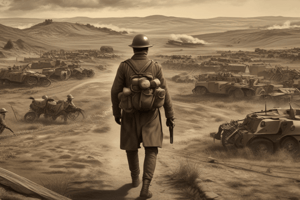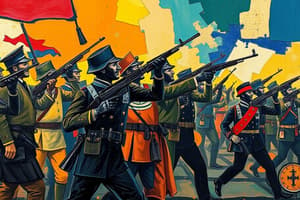Podcast
Questions and Answers
What is the main focus of Kraska and Paulson's argument in their 1997 article?
What is the main focus of Kraska and Paulson's argument in their 1997 article?
- Paramilitary units in the military
- Police-community relations
- Ethnographic studies
- Police militarization (correct)
What did the review of Kraska's articles and their cited sources reveal?
What did the review of Kraska's articles and their cited sources reveal?
- The articles accurately interpreted the original source material
- The articles were based on extensive primary research
- The articles distorted the original source material (correct)
- The articles were widely acclaimed by law enforcement agencies
What method did the author use to assess the accuracy of Kraska's research?
What method did the author use to assess the accuracy of Kraska's research?
- Surveys
- Data analysis
- Ethnographic studies
- Interviews (correct)
According to Kraska and Paulson, what is the prime example of police militarization?
According to Kraska and Paulson, what is the prime example of police militarization?
According to the text, what did Peter Kraska oppose?
According to the text, what did Peter Kraska oppose?
What did Kraska observe about military and police special operations subcultures?
What did Kraska observe about military and police special operations subcultures?
What event led to a riot and a six-fold increase in shootings in Cincinnati?
What event led to a riot and a six-fold increase in shootings in Cincinnati?
'The 'Ferguson effect' suggests what about officers?'
'The 'Ferguson effect' suggests what about officers?'
'There is a fear among officers of being labeled as racists and facing what by the press and local politicians?'
'There is a fear among officers of being labeled as racists and facing what by the press and local politicians?'
What does the text suggest about ideological bias against police officers?
What does the text suggest about ideological bias against police officers?
According to Jefferson, paramilitarism primarily focuses on controlling:
According to Jefferson, paramilitarism primarily focuses on controlling:
How does Waddington define paramilitarism?
How does Waddington define paramilitarism?
According to Hills, paramilitarism is defined as:
According to Hills, paramilitarism is defined as:
What does Kraska's perception of militarism emphasize?
What does Kraska's perception of militarism emphasize?
What does Kraska's reliance on vaguely defined terms 'militarism' and 'paramilitarism' blur?
What does Kraska's reliance on vaguely defined terms 'militarism' and 'paramilitarism' blur?
What is evident in Kraska's ideological stance towards police use of force?
What is evident in Kraska's ideological stance towards police use of force?
What does Kraska's research concern?
What does Kraska's research concern?
What did Kraska observe among SWAT officers?
What did Kraska observe among SWAT officers?
What is Kraska's research criticized for?
What is Kraska's research criticized for?
What does the text raise questions about regarding Kraska's ideological position?
What does the text raise questions about regarding Kraska's ideological position?
What was the number of call-outs the SWAT team had from 1982 to 1995?
What was the number of call-outs the SWAT team had from 1982 to 1995?
What percentage of U.S. SWAT teams in cities with populations of 50,000 or more received training from military Special Forces personnel?
What percentage of U.S. SWAT teams in cities with populations of 50,000 or more received training from military Special Forces personnel?
What was the reason for the shift in the unit's functioning according to the text?
What was the reason for the shift in the unit's functioning according to the text?
What did Kraska and Paulsen find disturbing about most SWAT teams?
What did Kraska and Paulsen find disturbing about most SWAT teams?
What event led to tensions between the police and New York City mayor, Bill de Blasio?
What event led to tensions between the police and New York City mayor, Bill de Blasio?
What is one criticism of Kraska's work according to the text?
What is one criticism of Kraska's work according to the text?
What did the police union official conclude?
What did the police union official conclude?
Who commented on the inhibiting effect of race on the behavior of a white officer?
Who commented on the inhibiting effect of race on the behavior of a white officer?
What event led to accusations against New York City mayor, Bill de Blasio?
What event led to accusations against New York City mayor, Bill de Blasio?
What do Kraska and Paulsen see as alarming according to the text?
What do Kraska and Paulsen see as alarming according to the text?
According to Kraska's work, what is disputed without proof?
According to Kraska's work, what is disputed without proof?
What do Kraska and Paulsen refer to as the 'paradox of coercive power'?
What do Kraska and Paulsen refer to as the 'paradox of coercive power'?
What characterizes routine police work according to the text?
What characterizes routine police work according to the text?
What do officers find pleasure in, according to Kraska and Paulsen (1997)?
What do officers find pleasure in, according to Kraska and Paulsen (1997)?
What is seen as a deterrent to actual violence and conflict according to the text?
What is seen as a deterrent to actual violence and conflict according to the text?
What is characterized as a significant aspect of police behavior according to the text?
What is characterized as a significant aspect of police behavior according to the text?
What do officers refer to routine calls as, according to the text?
What do officers refer to routine calls as, according to the text?
What is seen as a way to escape the unpleasant aspects of routine police work according to the text?
What is seen as a way to escape the unpleasant aspects of routine police work according to the text?
What is predominantly involved in day-to-day police work according to the text?
What is predominantly involved in day-to-day police work according to the text?
What are some challenging conditions officers have to work in based on the text?
What are some challenging conditions officers have to work in based on the text?
What do Skolnick and Fyfe (1993) refer to as the 'paradox of coercive power'?
What do Skolnick and Fyfe (1993) refer to as the 'paradox of coercive power'?
Flashcards are hidden until you start studying
Study Notes
Flawed Premises of Kraska's Research on SWAT Teams
- Kraska and Paulsen conducted a study on a police department with 391 sworn officers in a city of 250,000 people in the early to middle 1990s.
- From 1982 to 1995, the SWAT team had 208 call-outs, with a shift from reactive to proactive policing due to the crack epidemic.
- The change in the unit's functioning was a direct result of the crack epidemic, with the department's chief stating that the "dopers started barricading and arming themselves extensively."
- Kraska and Paulsen see the shift from reactive to proactive policing as alarming, citing concerns about the blurring of military and police functions.
- They find it alarming that 45% of U.S. SWAT teams in cities with populations of 50,000 or more have received training from military Special Forces personnel and that many SWAT team officers have a military background.
- Kraska and Paulsen also find it disturbing that most SWAT teams resemble military units in their dress and appearance, citing concerns about creating a "warrior mentality" to instill fear in others.
- The chief county executive, who was black, commented on the inhibiting effect of race on the behavior of a white officer.
- In 2014, Eric Garner died after a choke hold was used on him during an arrest, leading to tensions between the police and New York City mayor, Bill de Blasio.
- In December 2014, two police officers were executed by a gunman in New York City, leading the head of the police union to accuse the mayor of having "blood on his hands."
- The police union official concluded that "when police officers become victims, suddenly everyone loves a cop."
- The premises of Kraska's work are criticized for having vague definitions and ideological bias, and his research is seen as an attack on the police.
- Kraska's complaint about the movement of the state toward reverting to the use of military power signals its eroding ability to ensure order and compliance is disputed, with no proof offered for the claim that SWAT officers enjoy taking on military roles.
The Role of Fear and Subculture in Police Behavior
- Kraska and Paulsen (1997) discuss the fear instilled in citizens by SWAT teams, which reduces the chances of injuries to officers or civilians.
- Skolnick and Fyfe (1993) call this the "paradox of coercive power" where a nasty reputation deters actual violence.
- Police subculture is shaped by a universal fear of violence and the unpleasant nature of routine police work.
- Routine police work involves physical and grueling tasks, leading to low status and tarnishing the officers' standing.
- Officers find pleasure in the dangers of SWAT work, deriving a "rush" and feeling in control, according to Kraska and Paulsen (1997).
- Police subculture is characterized by a mission to protect the weak, a game of wits against "the bad guys," cynicism, and an addiction to adrenaline.
- Day-to-day police work is predominantly routine, involving mundane tasks and dealing with the same individuals repeatedly.
- Officers refer to routine calls as "UBS calls," indicating the routine and unpleasant nature of their work.
- Officers have to work in various challenging conditions, including rotating shifts and exposure to harsh weather.
- Promotion to administrative positions or joining a SWAT team are seen as ways to escape the unpleasant aspects of routine police work.
- The fear instilled in citizens by the appearance of force from officers is seen as a deterrent to actual violence and conflict.
- The paradox of coercive power, where a tough reputation reduces the need for actual violence, is a significant aspect of police behavior.
Studying That Suits You
Use AI to generate personalized quizzes and flashcards to suit your learning preferences.




